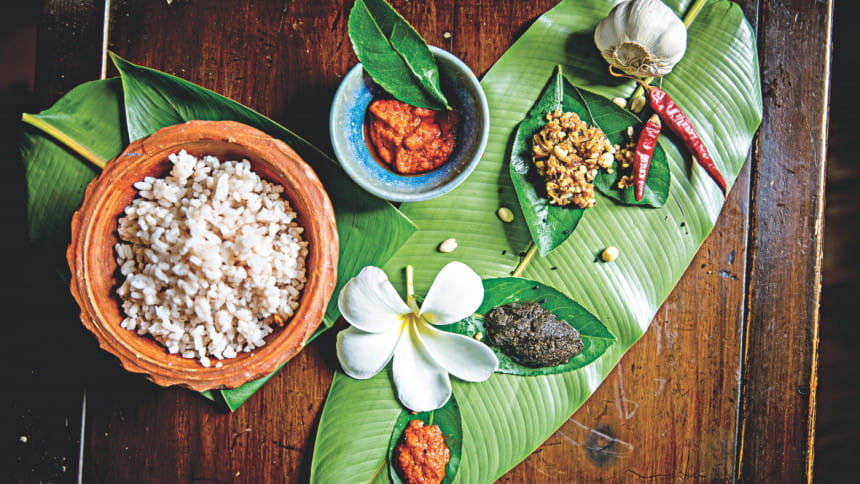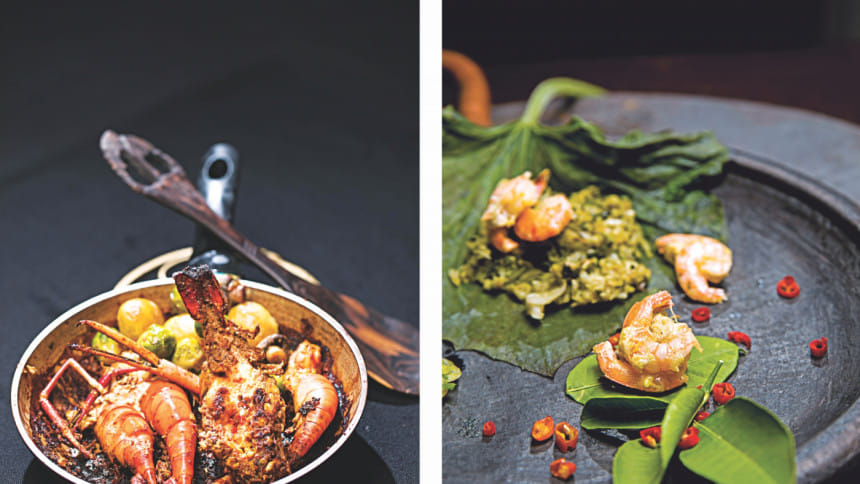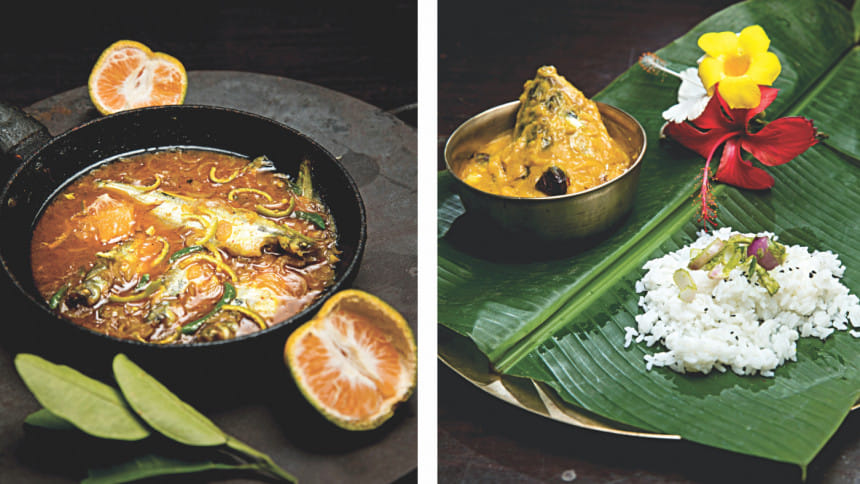Fish tales

Fish is liked the world over. Aside for their mouth-watering taste, and variety in dishes, they are also an important source of protein and other nutrients. Over 32,000 species of fish have been identified, making them the most diverse group of vertebrates. However, only a small fraction of that number is commonly eaten by humans.
NUTRITIONAL VALUE
Fish provide a good source of high-quality protein and a wide variety of vitamins and minerals, including vitamins A and D, phosphorus, magnesium, selenium, and iodine in marine fish. Its protein, like that of meat, is easily digestible and favourably complements dietary protein provided by cereals and legumes that are typically consumed in many developing countries.
Fish is also the world's best source of omega-3 fatty acids, which are incredibly important for the body and brain.

HEALTH BENEFITS
Generally speaking, all kinds of fish are good for us. They are high in nutrients that most people are not getting enough of from other sources. Here are a few health benefits of eating fish that are supported by research — Lower your risk of heart attacks and strokes. Increase grey matter in the brain and protect it from age-related deterioration. Help prevent and treat depression. Serve as a good dietary source of vitamin D. Reduce risk of autoimmune diseases, including Type 1 diabetes. Help prevent asthma in children. Protect your vision in old age. Improve sleep quality.
Whether the fish is fresh can be checked by looking for the following qualities: The skin looks bright, moist and shiny. The scales should be firmly attached to the skin. The skin on stale fish may show signs of wrinkling and shrinking away from the flesh. The eyes of a freshly caught fish will be convex, the pupil will be black and the cornea translucent. The eyes should be bright, clear and bulging and not sunken. The gills of freshly caught fish are bright red, but as the blood in them oxidises they rapidly turn brownish and any mucus on them turns opaque. If fish is split along the backbone and lifted, the bone should stick firmly to the flesh. If the bone separates easily, the fish is stale. The surface should be free of dirt and slime. The fish should be firm to touch with no traces of browning or drying around the edges. A fish having odour indicates deterioration due to oxidation of polyunsaturated fat and bacterial growth. Rancidity is revealed by yellowish spots on the surface. Rancidity can be recognised by a sour taste, uncharacteristic of fresh fish.
STORAGE
It is estimated that 10-15 percent of fish is spoiled during catch and further handling. Fish deteriorates quickly and should be used as soon as possible. It should be kept covered in the coldest part of refrigerator for no longer than two days.
Pre-packed fish and shellfish can be refrigerated in the original package for a short time. Fish wrapped in butcher paper should be taken out and wrapped in aluminium foil or plastic wrap.
Frozen fish maintains good quality when placed in the freezer immediately after purchase. Freezer temperatures of 0° F or lower are necessary to prevent loss of colour, texture, flavour and nutritive value.
Cured fish is best kept covered in the refrigerator. Open canned fish should be used up immediately or refrigerated.

CHITOL MACHER KOFTA
Ingredients
500g chitol fish
1 tbsp corn flour
1 tsp ginger paste
½ tsp garlic paste
½ tsp garam masala powder
3 green chilli paste
1 tbsp chopped onion
½ tsp turmeric powder
1 tsp roasted and powdered cumin seeds
½ tsp salt
Oil, for deep frying
Method
Wash the fish, and use fork or hand to separate bones from flesh. In a bowl, add all the ingredients except oil. Mix well. Make small sized round balls from the fish mixture. Heat oil in a pan. Place fish balls in the hot oil. Fry the kofta until golden brown. Remove from oil and serve.
GONDHORAJI MAACH (FISH COOKED WITH GONDHORAJ LIME)
Ingredients
6-7 pieces rui/katol fish
1 tbsp onion paste
1 tsp ginger paste
1 gondhoraj lime
2 leaves of gondhoraj lime
½ tsp turmeric powder
1 tsp red chilli powder
¼ tsp cumin powder
2 green chillies, slit
2 tbsp mustard oil
Salt, to taste
Method
Wash the fish and marinate with salt and a pinch of turmeric powder. Keep aside for 20 minutes. In a large wok, heat oil on medium heat. Turn the heat on low, and add the onion and ginger paste, and fry for 2-3 minutes. Add red chilli powder, turmeric powder, cumin powder and a little water.
Mix well, continue cooking on low heat for 1 minute. Add the fish and cook. Add the lime leaves and green chillies. Mix together. Cover and cook till the consistency of the gravy is to your liking. Squeeze the juice of the gondhoraj lime over the fish. Serve hot, with rice or polao.
KASHUNDI CHINGRI
Ingredients
250g prawns, deveined and cleaned
3 tbsp kashundi
1 raw mango, grated
4-5 green chillies
½ tsp turmeric powder
1 tsp red chilli powder
Salt, to taste
Sugar, to taste
Method
Wash the prawns properly. Marinate the prawns with salt and pinch of turmeric powder. Set aside.
In a wok, add oil, and once hot, add the prawns, turmeric powder, red chilli powder and green chillies. Sauté on low heat till the prawns change colour slightly, or for about 2 minutes. Add the grated raw mango and salt. Stir and cook for 2 minutes. Add the kashundi and mix well. Add 1 cup of water, and check seasoning. Cover, and let it simmer on low heat till the water has evaporated, and there is a thick gravy coating the prawns.
SHORSHE PABDA (CAT FISH WITH MUSTARD SEEDS FLAVOURED GRAVY)
Ingredients
6 pabda fish
1 tsp red chilli powder
½ tsp turmeric powder
¼ cup mustard seeds paste
2 green chillies
½ tsp nigella seeds
Salt, to taste
2 tbsp mustard oil
Method
Wash and clean the fish. Marinate and mix with salt and turmeric powder and rub all over fish and keep it marinating for at least 30 minutes. Heat oil in a pan. Temper half a teaspoon of nigella seeds and 2 pieces of green chilli. Stir for a few seconds.
Now add mustard seed paste, red chilli powder, turmeric powder and salt. Mix well and sauté for 2 minutes. When oil starts to separate from sides of pan, add 1 cup of water and fish. Mix and cover the pan. Cook for 15 minutes on medium heat. Once gravy starts to thicken and fish are done, add 1 teaspoon of mustard oil into the fish curry. Mix and switch off the flame. Transfer to a serving dish. Serve hot with steamed rice.
BOAL MACHER DOM
Ingredients
5-6 pieces boal maach
½ cup onion paste
2 tsp ginger paste
2 bay leaves
1 tsp cumin seeds
½ tsp turmeric powder
1 tsp red chilli powder
3 tbsp mustard oil
Salt, to taste
Method
Soak the bay leaves and cumin seeds in warm water for 15 minutes. Drain from water, and grind to a smooth paste. Add the onion paste, ginger paste, turmeric powder, red chilli powder, 1 tablespoon of mustard oil and salt to the prepared mixture. Add the fish pieces to the masala, and coat well. Keep aside for 10 minutes.
Heat 2 tablespoons oil in a flat pan. Gently place the fish along with the marinade in the pan. Cook over low flame for 8-10 minutes. Add half a cup of warm water, cover and cook for another 5 minutes. Finish with a generous drizzle of mustard oil. Serve hot with steamed rice.
PUTI MACHER TOK
Ingredients
250 g puti fish, cleaned and rinsed well
2 tbsp oil
½ tsp mustard seeds
2 dry red chillies, broken into half
½ tsp turmeric powder
2 green chillies, slit
1 tsp tamarind paste, mixed in 1 cup water
Salt, to taste
Method
Marinate the fish with a pinch of salt and turmeric powder for 10 minutes. Heat oil in a pan and temper with mustard seeds and dry red chillies. After it stops spluttering, add the tamarind water, salt, turmeric powder, green chillies and the fish. Simmer on low to medium flame for 6-8 minutes or till the gravy is slightly reduced. Switch off the flame and serve with plain steamed rice.
Photo: LS Archive/ Sazzad Ibne Sayed

 For all latest news, follow The Daily Star's Google News channel.
For all latest news, follow The Daily Star's Google News channel. 



Comments